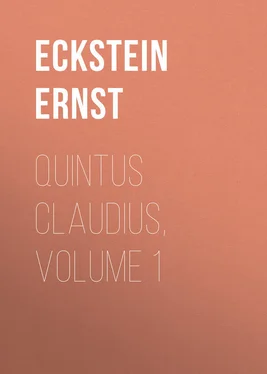Ernst Eckstein - Quintus Claudius, Volume 1
Здесь есть возможность читать онлайн «Ernst Eckstein - Quintus Claudius, Volume 1» — ознакомительный отрывок электронной книги совершенно бесплатно, а после прочтения отрывка купить полную версию. В некоторых случаях можно слушать аудио, скачать через торрент в формате fb2 и присутствует краткое содержание. Жанр: foreign_antique, foreign_prose, на английском языке. Описание произведения, (предисловие) а так же отзывы посетителей доступны на портале библиотеки ЛибКат.
- Название:Quintus Claudius, Volume 1
- Автор:
- Жанр:
- Год:неизвестен
- ISBN:нет данных
- Рейтинг книги:4 / 5. Голосов: 1
-
Избранное:Добавить в избранное
- Отзывы:
-
Ваша оценка:
- 80
- 1
- 2
- 3
- 4
- 5
Quintus Claudius, Volume 1: краткое содержание, описание и аннотация
Предлагаем к чтению аннотацию, описание, краткое содержание или предисловие (зависит от того, что написал сам автор книги «Quintus Claudius, Volume 1»). Если вы не нашли необходимую информацию о книге — напишите в комментариях, мы постараемся отыскать её.
Quintus Claudius, Volume 1 — читать онлайн ознакомительный отрывок
Ниже представлен текст книги, разбитый по страницам. Система сохранения места последней прочитанной страницы, позволяет с удобством читать онлайн бесплатно книгу «Quintus Claudius, Volume 1», без необходимости каждый раз заново искать на чём Вы остановились. Поставьте закладку, и сможете в любой момент перейти на страницу, на которой закончили чтение.
Интервал:
Закладка:
Ernst Eckstein
Quintus Claudius, Volume 1 / A Romance of Imperial Rome
PREFACE TO THE FIRST GERMAN EDITION
It was in Rome itself, in the sublime solemnity of the Colosseum, among the ruins of the palaces of the Caesars and crumbling pillars of the temples of the gods, that the first dreamy outlines rose before my fancy of the figures here offered to the reader’s contemplation. Each visit added strength to the mysterious impulse, to conjure up from their tombs these shadows of a mighty past, and afterwards, at home, where the throng of impressions sorted and grouped themselves at leisure, my impulse ripened to fulfilment.
I will not pause here to dwell on the fact, that the period of Imperial rule in Rome bears, in its whole aspect, a stronger resemblance to the XIXth century than perhaps any other epoch before the Reformation; for, without reference to this internal affinity, we should be justified in using it for the purpose of Romance simply by the fact, that hardly another period has ever been equally full of the stirring conflict of purely human interest, and of dramatic contrasts in thought, feeling and purpose.
I must be permitted to add a word as to the notes. 1 1 The publisher of this translation has, for the reader’s convenience, placed all the notes at the foot of the pages containing the corresponding text.
I purposely avoided disturbing the reader of the story by references in the text, and indeed the narrative is perfectly intelligible without any explanation. The notes, in short, are not intended as explanatory, but merely to instruct the reader, and complete the picture; they also supply the sources, and give the evidence on which I have drawn. From this point of view they may have some interest for the general public, unfamiliar with the authorities.
Leipzig, June 15, 1881. ERNST ECKSTEIN.CHAPTER I
It was the morning of the 12th of September in the Year of Our Lord 95; the first cold gleam of dawn was shining on the steel-grey surface of the Tyrrhenian sea. To the east, over the gently undulating coast of Campania, the sky was tinged with that tender dewy-green which follows on the paling of the stars; to the west the waters still lay in impenetrable darkness. Their almost unruffled face was swiftly parted by a large trireme, 2 2 Trireme. “Three-oared;” a vessel with three ranks of rowers, one above another. The time was given by the beats of a hammer or by word of command; not unfrequently by an air played on a flute or a sailor’s chant ( cantus nauticus ).
just now making its way from the south and opposite to Salernum, between the Posidium 3 3 Posidium, now called the Punta della Licosa, south of the Gulf of Salerno.
promontory and the Island of Capreae. 4 4 Capreae, (Isle of goats) now Capri.
The oars of the crew, who sat in rows on three ranks of benches, rose and fell in rhythm to a melancholy chant; the steersman yawned as he looked into the distance, hoping for the moment of release.
A small hatchway – fitted with silver ornaments – now opened on to the deck from the cabin between decks; a fat round head with short hair showed itself in the opening, and a pair of blinking eyes looked curiously round in every direction. Presently the head was followed by a body, of which the squat rotundity matched the odd head.
“Well, Chrysostomus, is Puteoli 5 5 Puteoli. An important port in Campania, now Pozzuoli. Concerning Puteoli’s commerce, see Stat. Silv. III, 5, 75.
in sight yet?” asked the stout man, stepping on to the deck and looking across to the blue-black rocks of Capreae.
“Ask again in three hours time,” replied the steersman. “Unless you can succeed in looking round the corner, like the magician of Tyana, 6 6 Apollonius of Tyana in Cappadocia. An ascetic and ecstatic philosopher and miracle-worker (A.D. 50) often compared with Christ by heathen writers. (Philostratus wrote his life.)
you must need wait till we have the island yonder behind us.”
“What!” exclaimed the other, drawing a little ivory map 7 7 Ivory map. Sketch-maps of various routes were common in ancient times, and were often engraved on wine-jars, cups, etc.
from his tunic. 8 8 Tunic. The short-sleeved under-garment worn by both sexes, the house costume, over which men, when they went out, threw the toga, women the stola or palla. During the period of the empire a second garment, the tunica interior , corresponding to the shirt of modern times, was worn under the tunic.
“Are those rocks only Capreae?”
“Thou sayest, O Herodianus! Out there on the heights to the right, hardly visible yet, stands the palace of the glorified Caesar Tiberius. 9 9 The palace of Tiberius. For an account of the cruel and extravagant proceedings of Tiberius at Capri, see Tacitus Ann. I, 67, Suet. Tib. 40, Juv. Sat. X, 72 and 93. Insignificant remains of this palace are visible at the present day: Villa di Timberio ; the perpendicular cliff 700 feet high is called il salto (the leap.)
Do you see that steep cliff, straight down to the sea? That was where such useless fellows as you were dropped over into the water by Caesar’s slaves.”
“Chrysostomus, do not be impudent! How dare you, a common ship’s-mate, make so bold as to scoff at me, the companion and confidential friend of the illustrious Caius Aurelius? By the gods! 10 10 Castor and Pollux. Leda’s twins, the Dioscuri, were the patrons of sea-faring men.
but it is beneath me to hold conversation with you, an ignorant seaman – a man who carries no wax-tablets 11 11 Wax-tablet ( tabula cerata ). A little tablet covered with wax, on which memoranda were written with the stylus. In the schools the wax-tablet supplied the place of the slate, and in daily life was a substitute for our note-book.
about him, who only knows how to handle the tiller and not the stylus – a common Gaul who is ignorant of all history of the gods – such a man ought not even to exist, so far as the friend of Aurelius is concerned.”
“Oho! you are dreaming! you are not his friend, but his freedman." 12 12 Freedman. The institution of slavery ( servitium ) which existed from ancient times, was an extremely important factor in the organization of Roman society. The slaves ( servi ) were the absolute property of their masters, who had unlimited control over their destinies and lives. (This right was not withdrawn until A.D. 61, when the law of Petronius prohibited the arbitrary condemnation of slaves to combats with wild beasts, etc.) The slave could then be released by the so-called manumissio , and was styled libertus or libertinus . His position depended upon the greater or less degree of formality with which the manumissio was granted. The most solemn manner bestowed all the rights of the free-born citizen, but even in this case he was socially burdened with the same stigma that rests upon the emancipated slaves in the United States. If a freedman attained power and influence – which under the emperors was very common – the haughty representatives of the ancient noble families paid him external respect, it is true, but the man’s origin was never forgotten.
Herodianus bit his lip; as he stood there, his face flushed with anger and turned to the growing day, he might have been taken for an ill-natured and vindictive man. But good temper and a genial nature soon reasserted themselves.
“You are an insolent fellow,” he said laughing, "but I know you mean no harm. You sea-folks are a rough race. I will burn a thank-offering to all the gods when this accursed sea-saw on the waves is over at last. Was there ever such a voyage! from Trajectum 13 13 Trajectum. A Batavian city in the Roman province Germania, now Utrecht.
to Gades 14 14 Gades. A city in southern Spain, the modern Cadiz.
without landing once! And at Gades hardly had we set foot on shore, when we were ordered on board again! And if Aurelius, our noble master, had not had business to settle in Panormus 15 15 Panormus. A city on the north coast of Sicily, the modern Palermo.
with his deceased father’s host, I believe we should have made the whole voyage from Hispania to Rome without a break. I will dance like the Corybantes, 16 16 Corybas. In the plural Corybantes ; priests of Cybele. Their worship was a wild orgy with war-dances and noisy music. (Horace, Od. I, 16, 8: non acuta si geminant Corybantes aera, etc. )
when I am once more allowed to feel like a man among men! How long will it be yet before we reach Ostia?” 17 17 Ostia. The port of Rome, situated at the mouth of the Tiber.
Интервал:
Закладка:
Похожие книги на «Quintus Claudius, Volume 1»
Представляем Вашему вниманию похожие книги на «Quintus Claudius, Volume 1» списком для выбора. Мы отобрали схожую по названию и смыслу литературу в надежде предоставить читателям больше вариантов отыскать новые, интересные, ещё непрочитанные произведения.
Обсуждение, отзывы о книге «Quintus Claudius, Volume 1» и просто собственные мнения читателей. Оставьте ваши комментарии, напишите, что Вы думаете о произведении, его смысле или главных героях. Укажите что конкретно понравилось, а что нет, и почему Вы так считаете.












